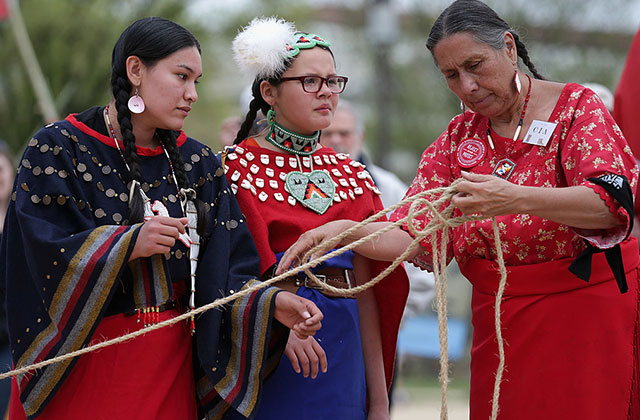The Ponca Tribe has experienced its share of pain: colonization, stolen land and, now, the Keystone XL pipeline.
The Des Moines Register explored the tribe’s battle against the 1,179-mile long pipeline in a story published yesterday (May 24). Though the Ponca lost this land 140 years ago to colonizers and now live in Oklahoma, they continue to hold it sacred. Knowing crude oil may flow through it worries them—so they’re not standing down. Especially given that their ancient lands sit in Nebraska, where permits for the $8 billion project are still waiting approval.
“I still belong to this land. This land sustained life for my people for thousands of generations,” said Mekasi Camp Horinek, a 44-year-old member of the Ponca, to The Des Moines Register. “And though they may have removed us from this land, they could never take it away from us, because it lives in our hearts.”
As the story points out, the Ponca have teamed up with White farmers and landowners who are opposed to the project for its forced land grabbing and potential environmental impacts. The concerns for the Keystone XL are similar to what was seen in North Dakota for the Dakota Access Pipeline: land, water and decision-making power.
The difference? Now, organizers have some solid practice and know what to expect with the Trump administration, which steamrolled both pipelines through presidential memorandums on January 24. And the Keystone XL is a battle activists have won in the past; former President Barack Obama rejected a key permit in November 2015 after seven years of resistance.
In certain ways it is as if organizers and pipeline opponents are back at square one as they try to keep the energy project at bay. But some believe there are valuable lessons to learn from the Dakota Access, which the Standing Rock Sioux Tribe is still challenging in court but is now operational.
“Honestly for us, the lesson at Standing Rock was to not only make it about one constituency,” said Jane Kleeb, president and founder of Bold Nebraska, an organization that has led resistance efforts in the state, “because it’s easier for the other side to divide and conquer.”
The Ponca play a key role in this alliance. For them, the pipeline route poses risks to sacred sites and ancient burial grounds. They’ve already lost most of their language and culture through their forced migration. They don’t want to lose more.
“It’s not an economic value, it’s a sacred value. When the Lakota saw the Black Hills, they saw god. When white Europeans saw the Black Hills, they saw gold,” said Joe Starita, a journalism professor at the University of Nebraska who has written about the Ponca removal. “That’s one letter of the alphabet different, but it’s the difference of the Grand Canyon.”
Read the full story here.
